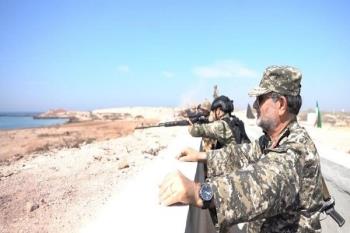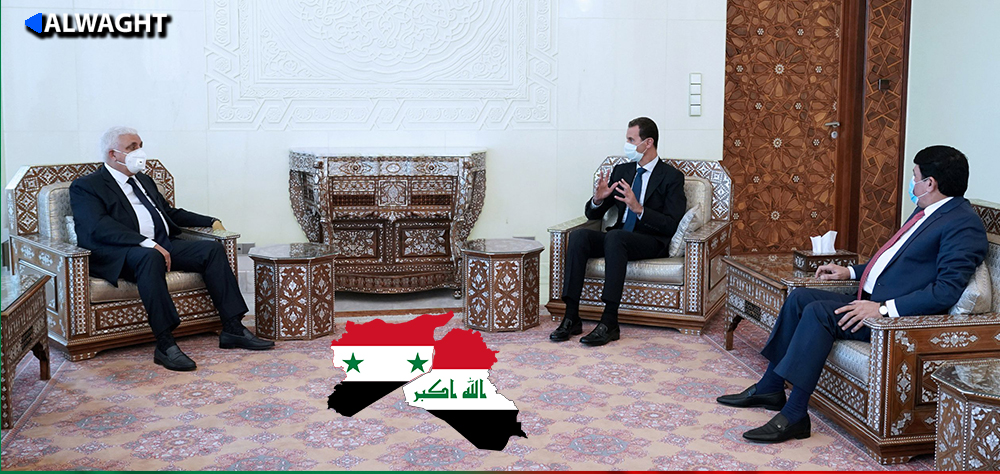Alwaght- On Friday, Iraq’s Popular Mobilization Forces (PMF) chief met in Damascus with the Syrian President Bashar al-Assad. During the meeting, Faleh al-Fayyadh delivered to the Syrian leader a message from the Iraqi Prime Minister Mostafa al-Kadhimi who addressed the bilateral relations and affairs of interest of the two countries at political and security levels and especially the fight against terrorism and the cooperation to battle the remnants of terrorist groups on the common borders, reported Syrian Arab News Agency (SANA).
The two sides also discussed the regional conditions, the challenges ahead, and the importance of maintaining the coordination between Damascus and Baghdad in a variety of areas that empower the two "brotherly" countries to face the challenges.
The Syrian ambassador to Iraq was also present at the meeting, SANA reported.
Iraq pushing for relations boost with Syria
Iraq is in intensified effort to expand relations with its neighbor, Syria. Both countries are wounded and damaged by ISIS terrorism, so it is natural for both sides to double their efforts to give their ties a boost.
On the other side, other Arab countries are still at odds over Syria’s return to the Arab League and normalization of ties with Damascus, though after months of talks and efforts especially by Iraq, the scales are shifting in favor of Syrian return to the Arab bloc. Algeria as the host of the upcoming summit is interested to make a difference in the gathering.
Iraq-Syria relations have also been pursued and strengthened in recent years through the Joint Counterterrorism Center, and the two countries are currently cooperating within the framework of the quartet intelligence-sharing center that includes Baghdad, Tehran, Moscow and Damascus to fight terrorism.
The quartet center for security and intelligence was formed in 2015 and is represented by the military representatives of the four countries in Baghdad. The exchange of intelligence, especially the intelligence supply of Iraqi and Syrian forces for identifying and targeting important and sensitive positions of the terrorist group ISIS and other takfiri groups in Iraq and in some cases in Syria, has been one of the most important and successful functions of the center.
US obstructing Syria-Iraq bonds
The US-led military coalition has been deployed in parts of Syria and Iraq for the past several years under the pretext of fighting the ISIS. The Americans have taken control of the Al-Tanf border crossing between Iraq and Syria over the past few years. The crossing is located in the border triangle of Iraq, Syria and Jordan and on the route that connects Baghdad to Damascus, and for this reason, it is of vital importance. US officials have said they intend to occupy the area to carry out attacks against ISIS, but Washington's real goal was to establish a buffer zone on the Iraqi-Syrian border to prevent land connection among Baghdad, Damascus and Beirut.
However, since last year, PMF and Syria each launched massive operations on the two sides of the border. Now the Resistance forces are in control of the Syrian-Iraqi border. The success of the operations both cut the logistics line of the ISIS on the border and foiled the US attempt to separate the Syrian and Iraq forces whose push from two sides of the border squeezed the terrorists.
Baghdad-Damascus cooperation grounds: from resistance to economy
As the military conflicts ease in both countries, time comes for economic cooperation of the Resistance nations. Transportation has is the key sector of cooperation. Marine transportation is not a suitable choice for these countries mainly because of high costs and long distance. Air transportation's costs are high, too. So, the best choice is the ground transportation.
The "Resistance Highway" initiative is an idea that could facilitate transportation between the countries of the Axis of Resistance, starting in Tehran, passing through Baghdad and Damascus, and reaching Beirut and Latakia on the Mediterranean coast.
Moreover, the military cooperation of the Resistance camp states kept the US from realizing its goal of creating "new Middle East." As Washington and its allies lost the military confrontation, they began a cowardly economic war against the Resistance nations, all to bring them on their knees. Economic cooperation among the Resistance states at present is more vital than ever to frustrate the Western plots.



























